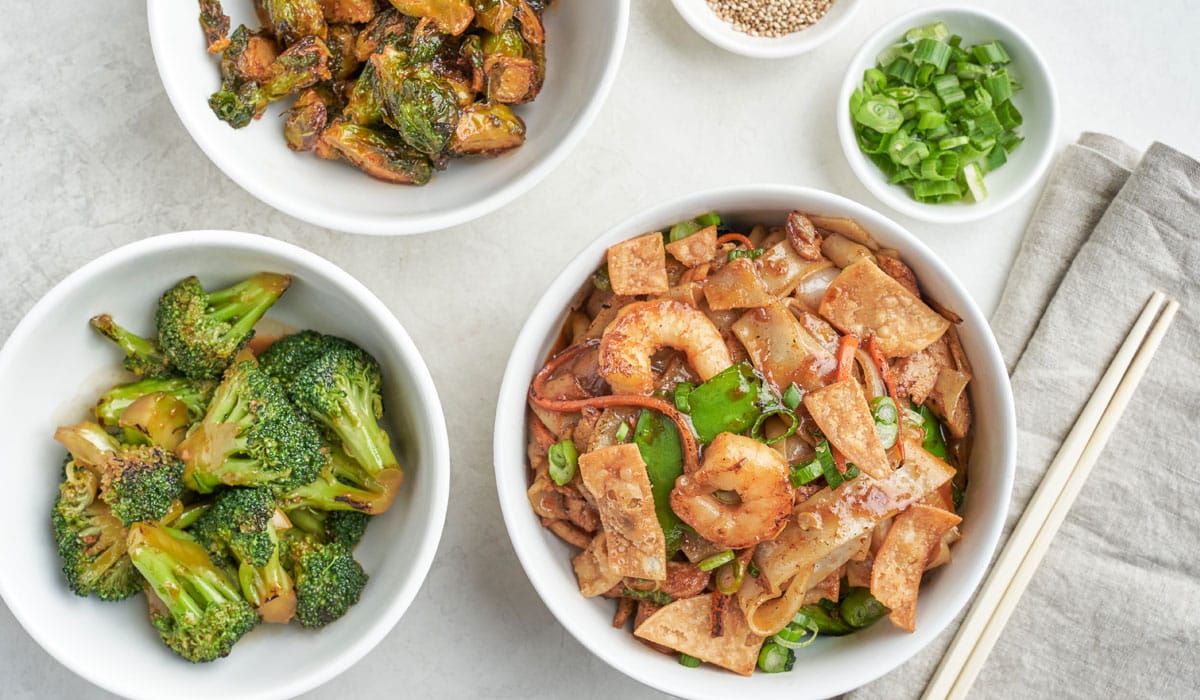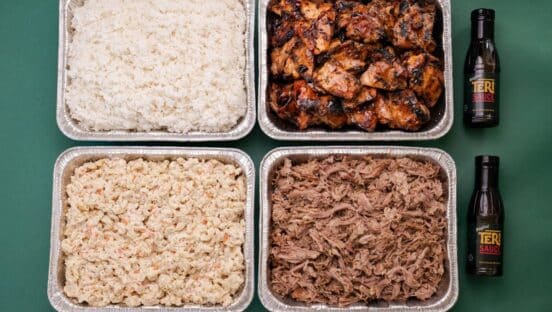Living in Amsterdam for a year during college, Brennan Foxman discovered the appeal of Southeast Asian street food culture. The concept of wok cooking in fast food intrigued him.
While still in college, Foxman got started achieving this dream, writing a business plan and reaching out to 40 banks or investors. Denied by most in the beginning, Foxman kept plugging along, eventually raising money from Bank of America and opening his first store in 2013 in Philadelphia’s Rittenhouse Square. He called it Wokworks.
The wok style cooking delivers an edge to the Philadelphia chain, allowing for a small amount of oil and fresh ingredients to cook quickly, fresh to order. Compared to traditional Chinese takeout, Foxman says, Wokworks provides a healthier, higher-quality product at around the same price point.
Given the way Wokworks was designed, the company was able to embrace the power of off-premises before the pandemic occurred, originally offering a fleet of food carts that then grew into trucks and digital delivery kitchens.
The off-premises friendly units are located in areas known as food deserts, or urban areas where it is difficult to buy affordable or high-quality fresh food. The franchisee funnel is also uniquely situated and created with social impact in mind. Wokworks taps exclusively into its pool of existing customers and employees for potential franchisees, specifically first-time entrepreneur minorities.
The brand’s digital-savvy and equity-focused decisions gave way to considerable success for franchisees, the majority of which see a 100 percent return on investment in their first few months of operation.
“We create this really amazing double-sided business where the community gets the benefit of this amazing, high quality food in an area where they otherwise don’t have anything like it and our operators get to build a big business in their communities, hire the people who live in those communities, and create a really amazing flywheel on both the business side and the customer side,” Foxman says.
Drawing from customers and employees, specifically minority first-time business owners, as a franchise funnel is more than a social impact play. This method ensures franchisees are close to the business and align with the brand’s goals before they get started. Soliciting franchisees and spending advertising money is not necessary, either, as Wokworks exclusively takes inbound inquiries.
The would-be first-time minority business owners in Philadelphia that Wokworks draws on know their neighborhoods well, and Wokworks stands out against the competition. Overall, because of their brand loyalty, love for the product, and ability to execute, these franchisees are the best partners for Wokworks, Foxman says.
And these are opportunities that this group of operators do not always have, as Wokworks gives back to its Philadelphia community.

“It just creates a sustainable path to empower entrepreneurs in neglected communities because our product is in this unique place where the taste preferences of customers, regardless of how much they have, or are willing to pay for food, all of their taste preferences and their health standards have gone up,” Foxman says.
Even if customers don’t want to pay $16 for a healthy bowl at a competitor like Sweetgreen, they still want quality ingredients. Wokworks serves this exact customer, with the food they desire at the price they want.
While big brands may be wary of putting $2 million stores in some of the areas Wokworks targets in Philadelphia, Foxman says this is to his advantage. Wokworks can empower people from those communities to create a sustainable business under the Wokworks brand, a type of franchise model Foxman says competitors are not even thinking about.
Foxman admits he, like many other consumers, has changed his dining habits in the past year. Now, most of the food he orders is delivered. Wokwork’s variety of unit formats reflects that change. Instead of expecting consumers to come to them, Wokworks brings the product to consumers, often setting up food trucks outside of apartment complexes.
“People are trying to order and get to your brand and your product in a bunch of different ways,” Foxman says. “They’re no longer just interested in finding a big restaurant at the corner of their street, waiting in line, sitting at a table. We sort of realized that we need to take our business to the customer and not have the customer take themselves to our business.”
Within the first week of Foxman opening Wokworks’ debut food cart, the cart was making more money than the store. Foxman quickly realized there was an opportunity to scale his food business differently.
Delivery kitchens, food trucks, and carts will continue to lead the way in Wokworks’ growth, but the company also landed a deal with a national grocer to put takeout outlets in the stores while building a retail component to products. This is all part of the push to meet customers where they are, a strategy that fits well into changing consumer trends.
With new locations popping up regularly, Wokworks proved its appeal, but there are still hurdles to overcome. One being staffing shortages. When COVID-19 hit, Wokworks closed all 10 of its food carts. To this day, only five reopened because of labor deficits.
“I wouldn’t attribute it to one specific thing, but I can say there’s no doubt that people left the restaurant industry over COVID and they decided they’re not coming back,” Foxman says.
Wokwork’s perspective on handling the hiring shortage is to stray away from the well-known corporate mantra of “many workers, little pay.” Instead, the company limits the number of operational requirements within the units, needing less people and paying them more.
Many Wokworks employees make $17 an hour, and food truck operators earn more than a $50,000 salary yearly.
“What we did is just sort of make the jobs within our business require someone who’s much more competent, who’s extremely hard working and that we can pay a lot more,” Foxman says.
Still, COVID was an opportunity to grow the business and explore different channels, like the first ghost delivery Wokworks concept that opened in April 2020. The ghost kitchen cost around $10,000 to set up, and soon enough, the unit was gaining more than $10,000 in sales per week.
Instead of focusing on Wokworks’ food carts in downtown business areas during weekday lunch, the brand leaned into takeout and delivery restaurants in addition to food trucks at apartment complexes where many residents were now staying home. Wokworks opened locations at three hospitals in an effort to deliver high-quality food to employees instead of the cafeteria food as the pandemic raged on.
In short, Wokworks proved its resilience, and business grew to be larger than before, with sales easily double what they were in March 2020. Now at 15 units, Foxman says Wokworks is eyeing new markets, likely in nearby locales like New Jersey, New York, and Delaware.
Wokworks shies away from identifying a specific unit measure of growth that it seeks. Rather, Foxman says the quality and caliber of franchisees is more important with an eye to the right neighborhood market.
“We’ve laid the foundation by making these smart decisions that may mean that we go slower, but I’m totally OK with that because I’d really like to build a brand and a business that sustains and that provides such a critical product to the people that we serve that in 30 years, they want the same thing,” Foxman says.



